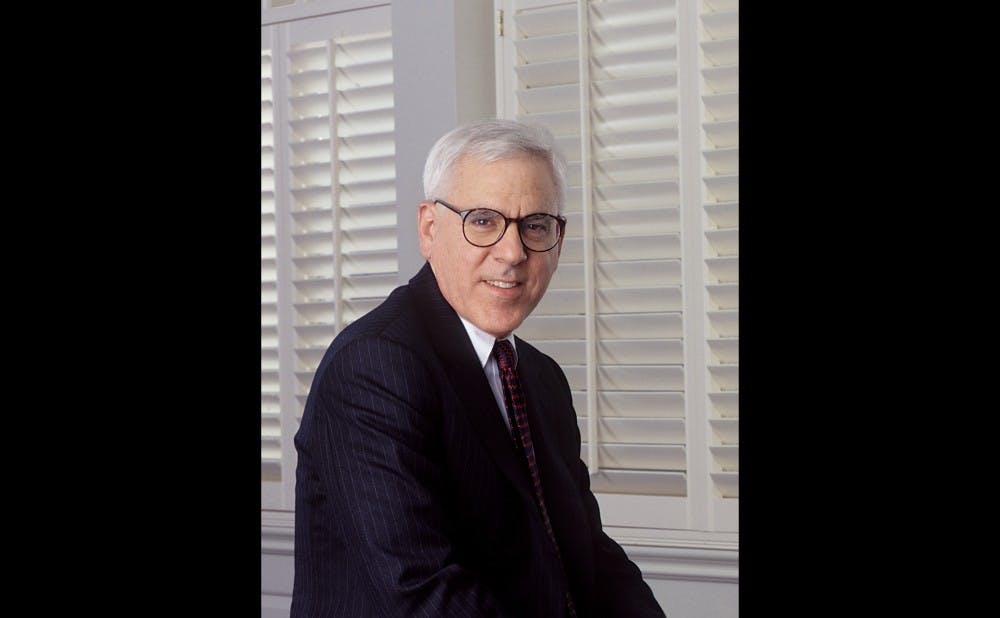David Rubenstein, Trinity '70 and chair of the Board of Trustees, announced in May that he will join the Harvard Corporation when his term as chair ends in July 2017. The Chronicle's Claire Ballentine talked with Rubenstein about the transition and his plans for future involvement with Duke.
The Chronicle: Why did you decide to step down from Duke’s Board of Trustees and join the Harvard Corporation?
David Rubenstein: Just to be clear, I am not stepping down from the Duke board in order to join the Harvard Corporation. My term as a Duke board member is limited to twelve years, and at the end of June next year, I will be required by our by-laws to leave the board. And that is appropriate. I am still interested in serving in ways that might be helpful to American higher education, and the Harvard Corporation presents such a chance. Interestingly, I will be replacing another person with Duke connections—Nan Keohane, the former Duke president.
TC: What do you think your greatest contribution to Duke has been and why?
DR: I think it is appropriate for others to judge what my contributions have been. But I am probably most proud of the fact I was able to show that someone who was a first generation college attendee and who needed financial aid to attend Duke, could become chair of the Board. I hope others in my type of situation will realize there are no limits to what one can achieve within the Duke community.
TC: What was the most important decision the Board of Trustees made during your time as chair?
DR: There was no one decision that could fairly be said to be the most important. There were many important decisions. But these decisions might collectively be categorized as providing guidance, counsel and support to Dick Brodhead as he sought to refresh and modernize Duke while maintaining the distinctive and appealing nature of Duke—at times a complicated minuet, but one which seems to have worked.
TC: How about the most difficult?
DR: The Board routinely deals with the most important issues facing Duke. Almost every one of these issues involves policy and funding tradeoffs of some consequence. Fortunately, the Board has a strong sense of collegiality, and a clear view that Duke’s best interests must always take priority over one’s individual interests. The result is a board that can come to clear decisions and can operate quite effectively.
TC: What is your relationship with Duke going to be moving forward?
DR: I hope to have an ongoing relationship with Duke for a great many years—hopefully the rest of my life. But I want to do so in a way that fully supports my successors, and I will be guided by their thoughts about where I might be most helpful.
TC: Do you plan to continue to make the same kinds of contributions to Duke?
DR: I expect to be supportive in a number of areas, including those where I have already been involved. But as new challenges and opportunities arise, as they inevitably will, I am likely to expand my current areas of support and interest. That would be my goal—to help Duke as it faces new ways to be an outstanding global university.
TC: What do you think your legacy at Duke is?
DR: I will leave others to judge my legacy. But I hope others will feel that I gave the position the time, energy, respect and commitment that it necessarily deserves. It has been an extraordinary honor to serve Duke in this way, and I look forward to being able to serve for one more year.
TC: What are your thoughts on Brexit and how it might impact Duke?
DR: I am not all that certain Great Britain will, when the costs are fully analyzed and digested, decide to leave the EU. ... I would not expect that [Brexit] would be meaningful in the overall picture for Duke.
TC: What are your thoughts on the protests outside the Allen Building this year?
DR: I am pleased that the protest was resolved peacefully. Hopefully, the perspectives of everyone involved in the protest, and also those involved in trying to resolve the matter on behalf of Duke, are now better understood.
TC: What do you think the search committee should be looking for in the next president?
DR: Ideally, the next president of Duke will have all of the outstanding qualities that Dick Brodhead has brought and is still bringing to the position. Without doubt, Dick will leave large shoes for his successor to fill. I have enormous confidence in the search committee.
TC: What do you think Brodhead’s legacy will be?
DR: Dick Brodhead’s legacy is not complete yet. He will serve another full twelve months as president, and I am certain that some part of his ultimate legacy will be achieved during this period.
But among Dick’s many accomplishments—and his legacy—will be increasing student financial aid dramatically; diversifying the student body, the faculty and the administration; transforming the campus with new and rejuvenated buildings; creating Duke Engage; creating the global health institute; enhancing Duke’s international reputation and presence; enhancing the quality of the student body and the faculty; fostering the interdisciplinary culture at Duke through programs like Bass Connections; combining national athletic success with strong academic achievement by student-athletes; completing what will be Duke’s largest capital campaign; and ensuring Duke’s continued place in the firmament of the country’s most respected research universities.
Get The Chronicle straight to your inbox
Signup for our weekly newsletter. Cancel at any time.

